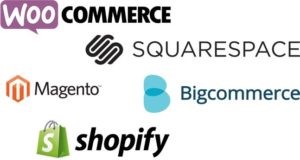A Guide to Getting Online: Part Two – Technology

In this second post in the series about getting online (you can find the first part here!), I am taking a look at the technology platforms and decisions you will need to make as part of that process.
You might be surprised that I didn’t look at this first, but in truth, you want to run a business, not become an IT expert. IT will become a more significant part of your world as an eCommerce operator, but if you don’t get your strategy and mission correct first, and have good content, then no platform will save your enterprise.

Thankfully, the technology part has become a lot more comfortable in the past couple of years, with the advent of several cloud-based services that take away the hosting, security, and maintenance headaches for you. In truth, any of the platforms mentioned in the graphic above will do the job for you. I’ve also just started to help a small operator whose store is built on WIX, and while it might be restricted in some ways, it was more than fine to get up and running.
Your eCommerce platform needs to do the following things for you:
- Content management, including product and non-product content
- Product search (Amazon has taught us to use the search box, not the navigation)
- Provide shopping cart capability
- Product and Inventory management
- Pricing Tools (including discounts, offers, and promotions)
- Payment Systems Integration
- Order Management
- Integration with shipping and other providers
If you have invested a lot in your current website and content, and it is on WordPress, then WooCommerce is a plug-in works very well. There are lots of developers and add-ons out there that will help you get that integrated, and up and running quickly.
However, my preference at this time is for a SaaS-based solution for the simple reason that it should remove a lot of the hosting, backup, and maintenance headaches for you. Hosting performance and page speed is one of the critical things impacting your conversion rate.
So I would typically recommend either Shopify or BigCommerce as a platform choice. There are plenty of reviews on the web comparing both platforms, so I won’t go into all the details here. Still, the differences and advantages of either platform are minor enough that in the end, it may come down to what your Web Developer partner is familiar with or indeed your personal preferences.
Be careful when looking at the pricing differences as there are differences in transaction fees, sales limits, and what functionality comes included at each pricing tier for both platforms – some due diligence is required.
A couple of reasons you might go with BigCommerce instead of Shopify:
- Slightly more out of the box features included in BigCommerce
- More SEO friendly especially the ability to generate short URLs
- Slightly better GDPR compliance capabilities and Multi-currency options
A couple of reasons you might go with Shopify:
- With 200,000 or so stores, it’s the largest eCommerce ecosystem around at the moment. There are lots of add-ons and integrations that solve many of the business requirements you will have down the road
- No Sales limits
- Integrates into the social media space (this is where it started from)
- Probably the cheapest entry point if that is important to you
Email Platform
It might seem strange to elevate email to the same level as the platform decision, but I do count eMail as one of the core decisions you need to get right from the start. The reason this is important is, to build relationships with customers, you need to interact with them regularly, and while social media has its place in this, you will be sending a lot of emails.
The first mistake is to think of email as pushing discounts and offers. Think about it, if a shop assistant followed you around a real-world shop saying nothing other than having 5% of that or 10% off that, you would be irritated, and chances are, you would leave. Email is the mechanism to send content that builds trust and empathy with your store or brand. Emails need to be useful, engaging, and interesting to your audience – which means that your email platform has to have specific capabilities. Done right, email as a channel, can/should drive up to 30% of the revenue in your eCommerce store. It is still the most affordable and scalable marketing channel available to you.
In order to create effective email campaigns, your platform needs to do the following:
- Provide contact tagging so you can create dynamic lists and move people between those lists automatically based on the actions they have taken.
- Smart automation of emails and triggers, which sends specific emails when individual pages are visited on your website.
- Provide a good email template collection and builder, as well as the ability to test different versions of an email.
- eCommerce data integration so the two platforms can talk and allow you to execute the right actions based on data.
- Helpdesk integration. Customers expect a seamless experience. Everyone needs to be able to see the entire customer communication context. Customers hate having to repeat information a second time.
- Smart send and scheduling options. Different times in the future, for example.
You will also probably need to manage multiple lists and sequences:
- Master list of all subscribers
- Pre-purchase subscribers
- Post-purchase subscribers
- Abandoned carts sequence
- Lists for offers that users have opted into
- Dynamic lists based on audiences from your website
To engage and nurture your customer base, they likely will be getting one or more emails a week. Never overdo it, and make sure the emails are tailored and relevant. To manage that, you are going to need a little help from your platform. While there are tons of them out there, and things like MailChimp work well in a variety of situations, the two that I would recommend are Klaviyo and Active Campaign.
Klaviyo was designed as an email platform to support eCommerce. Still, I also use Active Campaign with several clients as a very affordable platform that is really feature-rich (for transparency, I am an affiliate partner for Active Campaign). As an added benefit, their support team is excellent and now generally based in Dublin (again some local bias!).
Good content shared correctly via email will have a dramatic impact on your sales performance.
Analytics
The reason eCommerce is different from a traditional business is the level of data and understanding you can develop about your customers. What content do they find engaging? Where do they exit your site? What are the demographics of your visitors? To have this data, you must have Analytics installed, and more importantly, configured correctly. Depending on your eCommerce platform, that can be easy or difficult.

For most people, there is only one game in town, which is Google Analytics. There is no need to look at anything else. While it is frightening for some people, I am still surprised by the number of people I meet with websites and online stores who do not have a good grasp of what their data is, or what it is telling them.
Anyone can get up to speed with analytics, but be prepared to invest time (and get some outside help where needed) to learn them thoroughly. Being able to pick the right performance metrics, and to make sure you make the right decisions based on reliable data (I talk about the correct KPIs in a different post) makes all of the difference. At a minimum, you will need to build the right goals and funnels in your analytics application to understand where people are starting their shopping journey, and where they are exiting before completing a purchase. That way, you will understand what parts of your content are not working and what needs to be improved, including the relevant sections of your site.
Conclusion
There are many other add-ons and apps that we will look at in the Marketing and Demand Generation. Still, these are the core elements and platforms that you will need to become familiar with to be successful, and the decisions you make on these core elements are essential because there will be significant effort invested into getting this set up correctly and running well.
It is difficult to outsource the operation of these elements to a third party as you have the best product and customer knowledge and, therefore, should be best positioned to make the right operational decisions. Your eCommerce partner should be able to help you interpret the data, help identify the right business priorities, and look after the technical elements for you to help you grow and scale your eCommerce setup.
WSI was founded in 1995 and is an innovative digital marketing agency with offices in over 80 countries. We’ve spent over 20 years helping more than 100,000 companies and large global brands unlock the full potential of their business by leveraging the Internet and its many unrecognized opportunities. We’d be happy to help do the same for you and consult on your digital marketing strategy. Simply give me a call or email me at rknutsen@wsiebizsolutions.net to learn more.
About the Author
Rick spent 20 years in the insurance industry in finance, primarily developing reporting platforms for B & C stakeholders. His ability to speak to consumers of data (managers and analysts) and translate their needs to programmers led him to start his own digital marketing agency in 2004 to develop data driven solutions for business owners.
The Best Digital Marketing Insight and Advice
We are committed to protecting your privacy. For more info, please review our Privacy and Cookie Policies. You may unsubscribe at any time.
Don’t stop the learning now!


